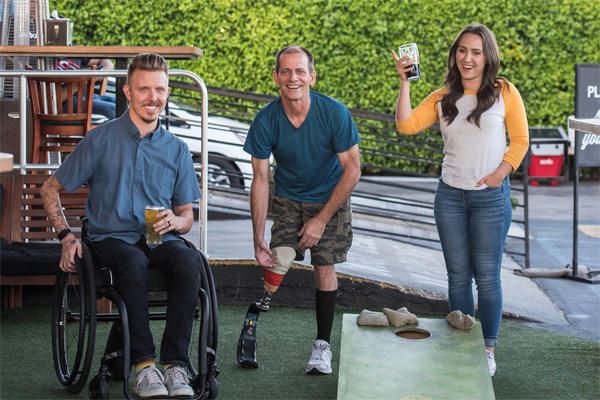Consumers with disabilities across the UK are not only overlooked by advertisers, but they are experiencing limited choice, leaving them feeling disempowered when purchasing products, services and activities, confirmed new research.
As a result, 43% of consumers with disabilities abandon shopping tasks without purchasing, revealed Business Disability Forum’s (BDF) latest report. The research entitled, What disabled consumers choose to buy and why, explores how people make decisions about where they shop and what they purchase. Supported by Microsoft, the research examines the buying experiences of the one in five people who have a disability in the UK.

DISEMPOWERED BY LIMITED CHOICE
The research revealed that not only are consumers with disabilities overlooked by advertisers; but limited choice leaves them feeling disempowered. Of the disabled consumers who participated in the research:
- 90% said they were affected at the decision-making stage of purchases due to limitations of design; limitations in available information; or how information was presented.
- 65% felt that choices of what to buy ‘are limited on a daily basis due to barriers’.
- 27% disagreed with the statement: ‘I am able to request adjustments or identify my preferences or needs when I try to buy a product or service’.
- Over half were likely to feel limited by choice, specifically because of their access needs when booking holiday accommodation (59%); or in relation to leisure activities (56%).
- Over 4 in 10 people with disabilities said they were limited to some extent when booking a new place to eat; finding a new provider (electricity, gas or broadband); and opening or changing a personal bank account or renewing or changing insurance provider.
OVERLOOKED BY ADVERTISERS
Additionally, only 38% of disabled consumers agreed with the statement: ‘In general, I feel businesses advertise to people like me’; with one-third of disabled consumers disagreeing. As one disabled consumer shared: “[It’s] important to me that I have information in the ads to enable me to make that same choice as everyone else.”
The survey also revealed poor customer service and inaccessibility. “[It’s] not necessarily the money and physical facilities that make an experience – it is the people there and how they respond,” shared another disabled consumer that took part in the survey.

BARRIERS & POOR CUSTOMER SERVICE
In fact, 43% of respondents who experienced barriers when shopping left or abandoned an online shopping task early. The figure was the same for in-person shopping. For in-person purchases, the barriers most commonly mentioned included:
- Not having customer or sales staff available to help (54%).
- Space to move around the shop (52%).
- Placement of the items I want to look at (47%).
- Access into the shop itself (40%).
- The shop being too busy with other customers (37%).
For online shopping, barriers included:
- Finding information related to accessible features about the product (47%).
- Confusing routes through the website or app/hard to find what was needed (45%).
- Accessibility issues with the website or app being used (42%).
- Having limited access to/unable to use customer services to help (40%).
- Customer services not being able to give information needed about products (30%).
LACK OF ACCESSIBLE INFORMATION
Additionally, consumers with disabilities also highlighted a lack of accessible information. “I ended up staying with my current bank because I couldn’t get information in easy read format from any other bank,” noted one consumer. At least seven in 10 stated that their disability ot access needs had made it more challenging to find the information they needed in certain sectors:
- Days out for leisure (77%).
- New places to eat out (75%).
- Holiday accommodation (73%).
- Banking and insurance services (70%).
- Over half of the respondents said the same for the remaining sectors we asked about (retail, utilities, and technology).

URGENT NEED FOR CHANGE
Commenting on the results of the survey, Diane Lightfoot, CEO, Business Disability Forum, stated: “Businesses cannot afford to overlook the needs and spending habits of disabled consumers. Yet, too often, disabled people face limited choice, increased costs; or even difficulty finding the goods and services they want and need.”
“For disabled people, the need for better access to services and products has never been more urgent. Many disabled people face additional costs associated with having a disability,” she added. “With living costs rising, it is more important than ever that disabled consumers have the information they need to make informed purchasing decisions; and to get the best deals possible. Our research shows that there is plenty of good practice out there; but it can be patchy, and varies from sector to sector.”

POSITIVE SIGNS
Around 74% of disabled consumers believe that businesses they buy from ‘have a long way to go to ensure products/services and accessible for all’. As one consumer with disabilities shared: “It’s little things that can make a really big difference. They show that the business is thinking about the customer journey of everybody… I am more likely to want to continue that relationship in the future.”
The research found that there are some positive signs of change. They include:
- Almost two thirds (65%) of consumers with disabilities agreed that the companies they use are starting to recognise the importance of accessible and inclusive products/services.
- Just over half (54%) said that they have noticed a positive change in how they were treated as a disabled/older customer.
WHAT DISABLED CONSUMERS WANT
Consumers said that businesses need to:
- Provide information about the accessibility and usability of products and services and make it easy to find.
- Offer a range of ways for consumers to get in touch (for example email, telephone and webchat).
- Make sure all websites and apps are fully accessible, as well as all physical environments. Think about parking and access into premises, as well as the premises itself.
- Ensure customer service/support staff have knowledge of the products/services available. Additionally, ensure disabled consumers can access and use them.
- Design products and services with inclusion in mind. Product or service design needs to be user-led, tested and ‘fit for purpose’.
BUSINESS RESPONSE
In response, businesses recognised that they need to:
- Create opportunities for consumers to ask questions. Tackle perceptions that staff are too busy or not prepared to help. Conversation should be directed to ‘needs’ rather than ‘disabilities.’
- Train customer facing staff. Businesses recognised that staff need to be proactive in approaching customers and ready with a response if asked for help.
- Increase representation of disabled people in the workforce to increase understanding and to demonstrate what the business represents.
- Offer alternative contact options to help encourage dialogue between the business and the consumer.
- Develop targeted services at a local level.
DEEP INSIGHTS
The insights from BDF’s research are based on the views and experiences of 698 respondents with disabilities or access needs.
The research considers purchasing experiences across several areas, including retail; hospitality; utilities; days out and leisure; holiday accommodation; banking and insurance; and technology. Its findings and recommendations cover user-involvement, accessibility, communication, customer service and training. To view the report’s full findings of including sector specific reports, findings and recommendations, click here.
People with disabilities at work also feel ‘overlooked’ or ‘left out’, according another BDF report. Click here to read more.






































